Packaging matters more than ever, and this has led many companies to choose the right materials based on their specific needs. High Quality General Flexible Packaging Bags are now a crucial choice for companies trying to give better product display, great product protection, and improved efficiency in packaging operations. Guided by the belief that quality affects their clients' operations, Hubei Jinde Packaging Co.Ltd. is devoted to delivering exclusive packaging solutions for different business needs.
Our dedication to quality and customers fuels our R&D into plastic packaging materials that are innovative and functional. When companies select High Quality General Flexible Packaging Bags from Hubei Jinde Packaging Co., Ltd., they gain from better strength, flexibility, and custom options to requirements. In this article, we will just go over briefly the many ways in which high-quality flexible packaging can act as a game-changer for you to gain enhanced customer satisfaction and highest operational success opportunities.
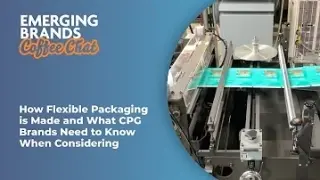
High-grade packaging is undoubtedly very important because it is associated with longer shelf life of the products, which is a very appreciable factor for the business wanting to keep their products fresh. Reports from the industry recently indicated that modern flexible packaging well designed can extend the shelf life between 10% and 50% compared to the old methods of rigid packaging. This has been attributed to the modern materials used as they have excellent barrier property against moisture, oxygen, and light, which are the worst enemies of the product. For instance, a certain company has developed a new form of packaging for a gift box that looks beautiful from the outside with ecologically friendly features. The emphasis was not only on how pretty it looked, but also on how well the box kept its contents fresh for a long time, aligning with sustainability goals. So, really, this is representative of the trend that packaging is moving toward-publicity because more and more companies are likely to notice the double impulse of really excellent quality packaging-in preserving product quality and supporting sustainable practices. Consumer demands have changed; consumers also want packaging that protects their purchase while bringing down the earth's degrading effects. Industry analysts state that 60% of consumers are willing to pay a higher price on their purchases simply because it was packaged with an environmentally friendly material, and that is why turning towards the flexible packaging option which is of high quality will give companies an edge over the competition. As companies turn their sides on efficiency and sustainability, investing into high quality flexible packaging becomes paramount in crafting an everlasting impression. This keeps the product's shelf life intact too.
Flexible package sustainable solution plays a vital role in the current environment-caring market. This indicates common people's consciousness for sustainable long run packaging in which companies are seeking to package their products without carrying much carbon content. Flexible packaging, as predicted by a report from Smithers Pira, will grow by 4.3% annually. There will be a shift from purely functional materials to "amenable" green attributes, according to this trend. Most of the general high-quality flexible packaging bags use fewer resources than rigid alternatives, thus resulting in less waste and less energy consumption during production.
Also, many of these high-quality flexible packaging products are engineered to be recyclable and/or compostable. According to the Flexible Packaging Association's research, 74% of consumers consider recyclability when making a purchase decision. Here is clear proof of the imperative need for businesses to focus on packaging that resonates with consumer values. Flexible packaging would give companies a win in regulation as well as directly address customer concerns, boosting brand reputations.
This entire argument goes beyond consumer preference, as flexible packaging proves to reduce logistics and carbon emissions during transportation. Whenever light-weight package and condition are optimized, the possible savings can be inferred from the American Forest & Paper Association's report that shipping costs and emissions will be lower as packaging will be space-efficient in transport vehicles. High-quality general flexible packaging bags will be yet another frontier in the sustainability journey while economically uplifting firms.
Every penny counts in the business world, and savings on packaging may hugely benefit companies. High-class general flexible packaging bags add to product presentation but are economically reasonable. Using quality materials reduces wastage of products due to better shelf-life and hence creates less replacement and spoilage cost.
Market-leading packaging bags are manufactured to withstand moisture, air, and light. Thus, they are less likely to allow products to be damaged in transit or storage. This implies that companies will be able to conserve their profits by minimizing losses while ensuring that their customers receive their goods in pristine condition. Furthermore, good packaging bags reduce the need for secondary packaging, thus saving money.
An equally important aspect of selecting quality flexible packaging is branding and marketing advantage. High-quality bags that can be customized give a competitive advantage to the product to stand out on the crowded shelf. A good package not only pulls customers' attentions but also says something about the brand in terms of quality, creating goodwill resulting in higher sales to compensate for the initial cost of packaging.
Shifts in consumer preferences have occurred in previous years, the most significant trend being the change towards sustainable and eco-friendly packaging. Ignited by wider environmental awareness, a higher demand for sustainability is expected for daily use items. Businesses have begun to realize that good-quality general flexible packaging bags can not only meet these requirements but also polish their image before the eye of conscious consumers.
Those promoted as eco-friendly alternatives-in a product bebiodegradable or recyclables-fall short of consumer demand with regard to seeking products that would lessen their environmental footprints. High-quality flexible packaging material foreign would act as a testament to consumers that the production enterprise indeed worth responsible practice. This will generate brand-willingness as well as bring other customers for whom such values matter. By this measure, one can expect not only sales growth in such a fitted business but also a positive perception of the brand.
One has to remember durability as another factor driving the trend. Consumers expect well-protected and preserved delivery warehouse shelf items. Good flexible packaging bags give the product the necessary strength and resilience to keep it intact, contributing to higher customer satisfaction. With durable packaging, businesses cut down on damaged and returned products, which in turn build up a collection that is more sustainable in use and reflects positively on customers. More competitive markets will embrace the dual focus for environmentally friendly and durable packaging strategies.
Packaging is a vital extension of a business's identity in any modern-day competitive market, and customization is one of its key elements. High-quality general flexible packaging bags are most likely to be very effective in containing products, but work great for narrating the unique story of your brand. You add your brand values, colors, and imagery to communicate and impress the consumers from the first moment when they interact with your product through customization.
Additionally, modern innovative flexible packaging makes the product look appealing to grab attention and motivate a consumer to make a purchase. The shelf seems to be enticing consumers. Outstanding designs or special finishes can, therefore, differentiate your brand from competitors. Incorporating particular elements of branding into your packaging design will, therefore, uphold your brand identity while promoting customer loyalty and encouraging repeat purchases.
Flexibility of modern packaging means there will be time for innovation in design and functionality. Businesses can choose almost any material in various shapes and sizes to suit their products perfectly. The enhancement of aesthetics also comes with keeping the functional needs safe and durable. In conclusion, placing a premium on customization in flexible packaging appears to be the kind of strategic move that goes a long way in brand identification and customer loyalty in the modern marketplace.
In light of the increasing demand for high-quality packaging solutions in different sectors, the flexible packaging industry is emerging and growing significantly. The global market for flexible packaging is expected to achieve a valuation of $429 billion by the year 2025, suggesting an approximate annual growth rate of 4.4%, as per recent information provided by Smithers Pira. This upward trend in the business is attributed to a variety of developments, the most pertinent of which are the desire for lightweight packaging materials that prevent wastage and prolong shelf life of products.
One of the core trends in an evolving market is an increase in demand for sustainable packaging. A survey by the Flexible Packaging Association determined that 74% of customers are more likely to purchase goods packed in eco-friendly materials. High-quality general flexible packaging bags not only satisfy sustainability concerns but also guarantee higher protection, flexibility, and customization. Businesses that promote these concepts of advanced packaging will earn better acceptance among consumers and will improve their branding image.
Moreover, the other foremost driver in the demand for flexible packaging remains the food and beverage industry. According to Mordor Intelligence, this segment alone constituted over 45% of the total flexible packaging market share in 2021, majorly due to the increasing trend of convenience food consumption and ready-to-eat meals. High-grade flexible packaging bags would assure quality product safety and freshness while providing an appealing presentation to contemporary consumers. Meanwhile, the rising trend of e-commerce has companies understanding that high-quality packaging is key to delivery and consumer satisfaction.
The rule of law becomes an important criterion that ought not to be ignored when selecting the flexible packaging bags for a business. The packaging industry is regulated very strictly based on region and product type, ensuring that materials applied are safe for the consumer and the environment. Smithers Pira has estimated that the projected value of the global flexible packaging market would amount to $348 billion by 2024, thereby emphasizing an upsurge in demand for compliance with industry standards and regulations.
FDA, EFSA-these act as guiding agencies presenting a whole set of requirements on materials that contact food products. Non-conformance puts the company at risk of hurting consumer confidence and facing serious legal consequences. A report by the International Packaging Association states that over 70% of companies suffered financially due to fines and penalties resulting from nonconformance of their packaging practices with the law. Thus, whatever money is spent on purchasing high-quality flexible packaging bags will ultimately help protect consumers and enhance the brand image of the company.
Compliance with sustainability norms is fast becoming a key requirement. Research done by the Ellen MacArthur Foundation indicates the capacity of 60% of consumers willing to support brands that embrace eco-responsibility through the use of recyclable and biodegradable packaging. Choosing flexible packing materials that cover safety standards and sustainability will give the business an edge while fulfilling the terms of emerging environmental legislation. With compliance as the foremost consideration, companies can find their way through the many twists and turns that embody the present-day packaging environment, chartering a course that guarantees both legal safety and customer satisfaction.
Flexibility-that can give fragmentation of technology. Packaging newer technologies in flexible packing are heralding a bright future for the industry, opening up ways for business solutions that can be more flexible to match changing needs. Such a trend can only become better in the years ahead with new innovations in manufacturing tech that are promising to offer future sustainable designs in cost-efficiency and customization. Businesses lean more toward advanced materials as enhancing the protection of their products but are also biodegradable or recyclable-end-of-life options to reduce environmental impact. These innovations help brands in resonate with consumer preference towards sustainability and durability yet quality.
Moreover, flexible packages with smart technologies promise much for the near future. Such features as QR codes, NFC tags, and temperature gauging systems could all be incorporated to facilitate better contact between consumers and brands. Intelligent packaging means better inventory management and tracking, enabling consumers to access such real-time information on the journey the product has made. Thus, it permits such transparency that creates trust in the consumer and-grown amenities for customer experience.
Additionally, various research and development projects into flexible packaging continue to throw up models for light weightage, with performance intact and reduced shipping costs. With shipping as the asset-lightest strategic component of business, this kind of packaging complements improved supply chains and reduced carbon footprints. The innovations are now indications of a future in which flexible packaging is not just functional but strategic in any competitive market.
Flexible packaging solutions have a significant environmental impact as they often use fewer resources compared to rigid alternatives, resulting in less waste and reduced energy consumption during production. They are also designed with recyclability and compostability in mind.
A study shows that 74% of consumers consider the recyclability of packaging when making purchasing decisions. This indicates that businesses must prioritize packaging that aligns with consumer values to maintain a positive brand reputation.
Flexible packaging is lighter than rigid packaging, which leads to reduced shipping costs and emissions due to more efficient use of space in transport vehicles, ultimately lowering the overall carbon footprint during transportation.
High-quality flexible packaging bags reduce wastage, improve product shelf life, and minimize product losses during transit or storage, leading to lower replacement and spoilage costs, thus enhancing business profitability.
Customization allows businesses to tailor their packaging to reflect their brand values, colors, and imagery, making a lasting impression on consumers and reinforcing brand identity, which can lead to increased customer loyalty and repeat purchases.
Attractive and well-designed packaging draws attention on store shelves and can elevate a brand above the competition. Unique designs can enhance visual appeal and encourage sales, aligning product aesthetics with consumer preferences.
High-quality flexible packaging is often durable and effective in preserving products, which reduces the need for additional protective packaging, ultimately lowering overall expenses for businesses.
As consumer awareness of sustainability increases, businesses are under pressure to choose packaging that minimizes their carbon footprint, meets regulatory demands, and aligns with customer concerns, enhancing their overall brand reputation.
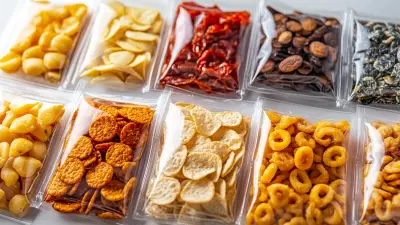
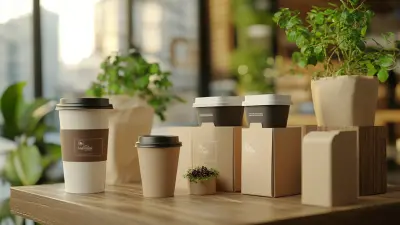
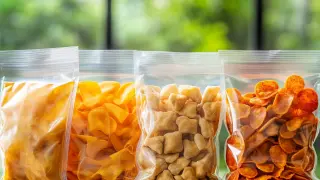
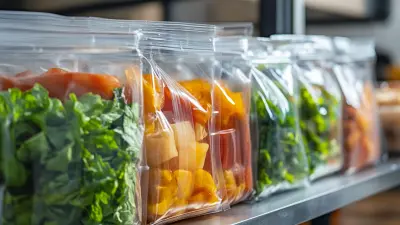


 中国
中国